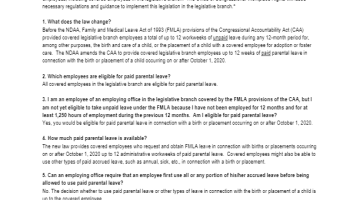On December 20, 2019, as part of the National Defense Authorization Act (NDAA) for Fiscal Year 2020, President Trump signed into law a major improvement in the federal compensation and benefits package that provides paid parental leave for federal employees, including covered employees in the legislative branch. The Office of Congressional Workplace Rights will issue necessary regulations and guidance to implement this legislation in the legislative branch.*
1. What does the law change?
Before the NDAA, Family, and Medical Leave Act of 1993 (FMLA) provisions of the Congressional Accountability Act (CAA) provided covered legislative branch employees a total of up to 12 workweeks of unpaid leave during any 12-month period for, among other purposes, the birth and care of a child, or the placement of a child with a covered employee for adoption or foster care. The NDAA amends the CAA to provide covered legislative branch employees up to 12 weeks of paid parental leave in connection with the birth or placement of a child occurring on or after October 1, 2020.
2. Which employees are eligible for paid parental leave?
All covered employees in the legislative branch are eligible for paid parental leave.
3. I am an employee of an employing office in the legislative branch covered by the FMLA provisions of the CAA, but I am not yet eligible to take unpaid leave under the FMLA because I have not been employed for 12 months and for at least 1,250 hours of employment during the previous 12 months. Am I eligible for paid parental leave?
Yes, you would be eligible for paid parental leave in connection with a birth or placement occurring on or after October 1, 2020.
4. How much paid parental leave is available?
The new law provides covered employees who request and obtain FMLA leave in connection with births or placements occurring on or after October 1, 2020 up to 12 administrative workweeks of paid parental leave. Covered employees might also be able to use other types of paid accrued leave, such as annual, sick, etc., in connection with a birth or placement.
